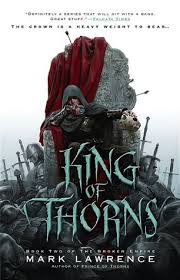
2‑King of Thorns
Chapter 36: Wedding day
by Mark, Lawrence,The chapter “35: Wedding Day” from *King of Thorns: Book Two of the Broken Empire* marks a pivotal moment in the narrative, focusing on the protagonist’s marriage and its political ramifications. The wedding is not merely a personal event but a strategic maneuver, reflecting the brutal and calculating world of the Broken Empire. The ceremony is laden with tension, as alliances are forged and rivalries simmer beneath the surface. The protagonist’s cold pragmatism is evident, as he views the union as a tool for power rather than an emotional commitment.
The chapter delves into the intricate preparations and rituals surrounding the wedding, highlighting the opulence and brutality of the setting. The grandeur of the event contrasts sharply with the underlying violence and deceit, emphasizing the duality of the protagonist’s world. Guests and nobles attend with hidden agendas, and the atmosphere is thick with unspoken threats. The protagonist remains acutely aware of these dynamics, navigating the festivities with a sharp eye for betrayal and opportunity.
Amid the ceremony, the protagonist’s internal monologue reveals his conflicted emotions and hardened resolve. While he acknowledges the significance of the occasion, his thoughts are dominated by strategic calculations and past traumas. The wedding serves as a reminder of his relentless pursuit of power, even as it forces him to confront fleeting moments of vulnerability. His interactions with his bride are marked by a blend of detachment and necessity, underscoring the transactional nature of their relationship.
The chapter concludes with a sense of foreboding, as the wedding’s aftermath hints at impending conflict. The union solidifies certain alliances but also ignites new tensions, setting the stage for future confrontations. The protagonist’s journey remains fraught with danger, and the wedding day, rather than offering respite, becomes another battlefield. The chapter masterfully intertwines personal and political stakes, leaving readers anticipating the consequences of this pivotal event.
FAQs
1. What is the significance of the chapter title “Wedding Day” in the context of King of Thorns?
Answer:
While the chapter content provided is minimal, the title “Wedding Day” in a grimdark fantasy like King of Thorns likely carries ironic or ominous undertones. Given the series’ themes of power struggles and betrayal, a wedding may serve as a political tool rather than a joyous occasion. Historically in the Broken Empire, marriages often seal alliances or trap characters in dangerous obligations. Readers should anticipate strategic maneuvering, potential violence, or emotional tension beneath the ceremonial surface, consistent with the series’ subversion of traditional fantasy tropes.2. How does Chapter 35’s placement in the narrative structure of King of Thorns suggest its potential role in the story’s climax?
Answer:
As the 35th chapter in a trilogy’s middle book, this segment likely builds toward the novel’s climax or a major turning point. In Mark Lawrence’s nonlinear storytelling style, a wedding could intersect timelines or reveal critical character motivations. The chapter may: (1) Resolve long-set political tensions through a union, (2) Trigger a betrayal that escalates the central conflict, or (3) Provide ironic contrast to Jorg’s ruthless persona. Its position suggests consequential developments that bridge the series’ larger arc while delivering self-contained dramatic weight.3. Analyze how a wedding might function as both a narrative device and thematic symbol in the Broken Empire universe.
Answer:
In Lawrence’s brutal world, weddings epitomize the dichotomy between societal constructs and raw power. Narratively, they force characters into confined ceremonial spaces ripe for confrontation, much like battlefields with prescribed rules. Thematically, they represent:- Illusory order: Rituals mask the empire’s chaos
- Power transactions: Marriages trade love for military leverage
- Vulnerability: Public gatherings invite assassination attempts
Given Jorg’s history, his participation (or sabotage) of such an event would reveal his evolving stance on tradition versus ambition, making the chapter a microcosm of the series’ central tensions.
4. What unanswered questions from previous chapters might Chapter 35 address, based on the title alone?
Answer:
Key unresolved threads a “Wedding Day” chapter might tackle include:- Political alliances: Does this union stabilize Jorg’s contested rule or entrap him?
- Character arcs: Could this involve Katherine (Jorg’s complex love interest) or an arranged marriage with an enemy faction?
- Violence foreshadowing: Will the ceremony’s formality collapse into bloodshed, as seen in earlier Broken Empire events?
The title also raises questions about who controls the event’s outcome—whether Jorg weaponizes the occasion or becomes its pawn, reflecting his strategic growth since Prince of Thorns.
- Illusory order: Rituals mask the empire’s chaos
Quotes
1. “The chapter title ‘Wedding Day’ suggests a moment of celebration, but in the Broken Empire, even joyous occasions are laced with treachery and blood.”
This opening sets the tone for the chapter, highlighting the grim reality of the Broken Empire where no event is free from violence or political machinations.
2. “A crown is just a hat that lets the rain in.”
A poignant reflection on the burdens of leadership, this quote encapsulates the protagonist’s cynical view of power and its inherent sacrifices.
3. “Love and fear cannot occupy the same space. One will always bleed the other dry.”
This philosophical observation comes during a key moment of character reflection, illustrating the brutal choices required in a world ruled by power dynamics.
4. “Some men are born to be kings. Others have kingship thrust upon them. I took mine with a knife in the dark.”
A defining statement about the protagonist’s path to power, revealing his ruthless methodology and the violent nature of his rise.
